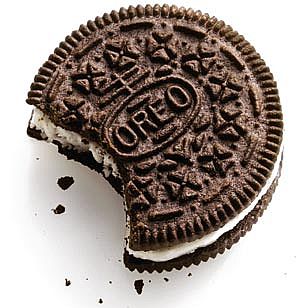by Jeff Ebbing
Southeastern Community College
West Burlington, IA

My town is better than your town.
Wanna know how I know? Because there’s a cookie factory in my town. And guess what it makes? Oreos. Well, sorta.
Turns out it’s the largest supplier of generic (OK, private label) cookies in the United States. If you buy a pack of store brand cookies at any major grocery chain, chances are it was made just down the road from my office. This place pumps out almost a million faux-reo cookies every day. It’s the basically generic Oreo capital of the world.
A few years ago, I got a chance to tour said factory. The scale of production is truly awesome. I saw a two-story tall cookie dough mixer drop thousands of perfect little dough balls on conveyor belts that roll through 300-foot-long ovens. It was pretty intense.
Oh, and remember that scene in “Toy Story 2” when Woody and Jessie get locked in their cases at the airport, and Buzz and the gang have to go find them in the massive luggage conveyor belt maze? Well it’s like that, only with cookies.
Toward the end of the tour, our guide led us to an unmarked door. After making a hush-hush phone call to what I can only assume was the cookie police, we were granted access to the Testing Room.
Imagine a clandestine cold war laboratory the KGB probably used to reverse engineer America’s James Bond-style spy gadgets. Everywhere you looked, there were magnifying glasses, densitometers, calipers, and other surprisingly high-tech tools. In it, a team of specialists tested how their cookies stack up against the competition. Their sole job was to conduct detailed autopsies on little crunchy creme-filled cadavers.
I am not making any of this up. (See? I told you: http://bit.ly/10MeWFh).
 Now I don’t know about you, but my Oreo-testing regimen consists of three steps: 1) open bag, 2) consume entire contents, and 3) engage in self-loathing for breaking yet another resolution to cut down on sweets.
Now I don’t know about you, but my Oreo-testing regimen consists of three steps: 1) open bag, 2) consume entire contents, and 3) engage in self-loathing for breaking yet another resolution to cut down on sweets.
Can you imagine how hard it is to keep a straight face when a person with chocolate-caked teeth uses terms like mouth feel, viscosity and palatability to describe a cookie?
No. You can’t.
Nerdy guy in lab coat: Consumer research shows that the creme filling palatability of our cookie is less than one standard deviation off from the national brand. We’re quite proud that it only took us two years to achieve this. It’s practically a clone. What do you think, Jeff?
Me: (spitting crumbs like Cookie Monster, trying to sound all science-y) Om-nom-nom, I like how it tastes more chocolatier.
It’s like I was stuck in a movie scene that was half “Desperately Seeking Susan, and half “Boys from Brazil.” I have to say the whole thing left me a little weirded out. That or it was the sugar.
So what does this have to do with community college marketing? Just ask: How well do we know OUR customers?
Thirty years ago the private-label industry was a basic, no-frills alternative for the price-conscious shopper. However, sub-par products that were once relegated to the bottom shelf now go toe-to-toe with national brands. What changed? They studied their customers, sized up the competition, and put out a better product.
For decades, community colleges treated education like generic cookies. Our product was cheaper and more accessible than the name brand, so people took what we offered. English was English; calc was calc, and Maslow’s hierarchy was just a lesson in psychology class. What other choice was there?
Want to be a dental assistant? We don’t have that, but medical assistant is pretty close, so be that. You want a student union? Here’s a pool table. Cappuccino? Put 50 cents in that machine over there, and no, we don’t make change.
Things are different now, and many of us have been sleeping at the wheel. Students don’t just go off to four-year schools any more, some move away to attend two-year schools. Let me repeat that. Students in your own backyard are choosing to go community college, just not yours. There are tons of reasons, but it all boils down to this: they’re not getting the love they want from you.
Successful community colleges are like new-and-improved, private-label cookies. They don’t just teach Maslow, they embrace him. They work hard to know their students and anticipate their needs before they even ask. These schools invest in novel services, cool facilities and high-tech career programs.
They’re like that cookie factory. Always asking, always improving, always testing.
What are your students telling you? Are you even listening? Most importantly, what are you doing about it? Because if you’re not going to do anything, you can bet someone else will.
And that, my friend, is how the cookie crumbles.
Jeff Ebbing is director of marketing and communications (a.k.a. the marketing guy) at Southeastern Community College in West Burlington, Iowa. He likes music, mustard and a good laugh. And Oreos.


STAY CONNECTED